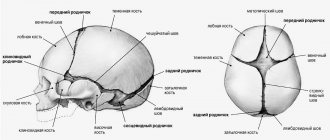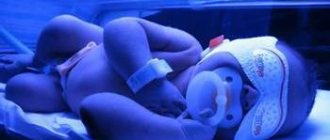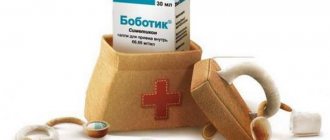Good time to you, dear readers. Today's article is devoted to the problem of problems of babies and young mothers. Colic in a newborn seems to be a standard situation in the first months of life, but it tortures both the baby and the mother so much that it seems there will be no end to it.
Unfortunately, many childhood diseases cannot be avoided by anyone, due to certain structural features of the little person’s body. What is colic in a newborn, symptoms, treatment methods - let's look for answers to these questions together.
What is colic and why does it appear?
The first 2 weeks after the birth of a baby are one of the calmest periods in a mother’s life; the baby cries only from hunger, the rest of the time he sleeps peacefully. But after 15-20 days, the nightmare begins - the baby constantly starts crying, eats worse, sleeps poorly - he is bothered by colic.
Colic is not a disease; it occurs in absolutely healthy children; boys suffer from this problem a little more often. The problem arises against the background of increased gas formation in the baby’s intestines - this is how the body begins to adapt to the process of swallowing and digesting food, the process does not always go smoothly.
The main causes of colic
- Incorrect attachment to the breast - if the baby swallows a lot of air while sucking, it will accumulate in the stomach and distend it. If your child is your firstborn, do not hesitate to ask the midwives at the maternity hospital for help so that they can tell you all the intricacies of proper feeding.
- Insufficient lactase - this enzyme is necessary for the normal digestion of lactose, which is found in all dairy products. It is difficult to deal with such a problem; most likely, the doctor will prescribe enzymes or advise you to switch to artificial feeding - there are many good lactose-free mixtures. But such a pathology occurs in only 1 baby out of 130 thousand newborns.
- Wrong diet of the mother - it’s not for nothing that breastfeeding experts insist on following a diet in the first months after the birth of the child; everything you eat goes with the milk into the baby’s intestines. The main provocateurs of increased gas formation in a baby are cabbage, legumes, fruits, milk, rye and bran bread.
- Frequent crying - when the baby sobs, he swallows a lot of air, which provokes the appearance of colic and hiccups.
- Overfeeding, being in a horizontal position for a long time - from birth you need to control the amount of food the child consumes, try to maintain a daily routine, and do not forget about physical activity, according to age.
Since increased gas formation can bother the baby for several months, every mother needs to know not only the symptoms of colic in a newborn, but also treatment methods.
Symptoms of colic in a newborn
It is easy to recognize an attack of colic; it proceeds approximately the same in all children.
How to understand that a newborn has colic - the main symptoms
- the child becomes restless, especially during feeding, or a few minutes after it ends;
- the baby often cries, moves, knocks his legs, presses them to his stomach;
- the face becomes red;
- the stomach is swollen, hard to the touch, the navel protrudes, there may be a slight arch in the back;
- sleep quality deteriorates;
- the child calms down a little only in his arms;
- The stool may become green, and sometimes constipation occurs.
Feeding a baby who suffers from colic is a difficult task - the baby constantly squirms, throws the breast or spits out the pacifier, gets tired quickly, and does not eat enough. The situation is aggravated by the condition of the mother, who begins to get nervous from powerlessness and confusion, and babies feel this very well.
As soon as the attack passes, the stomach becomes soft, the baby calms down and immediately falls asleep. How long does colic last? Typically, in newborns, an attack lasts 1.5-2 hours and begins approximately 25 minutes after the end of feeding.
The main causes of colic in infants - when does colic in newborns begin and when does it go away?

Parents of newborn children need to be prepared for the so-called “rule of three” : colic begins around the third week of the baby’s life, lasts approximately three hours a day and usually ends after three months.
Colic in newborns occurs for the following reasons:
- Unstable functioning of the digestive system and imperfect absorption of food leads to bloating (flatulence) in infants. Flatulence occurs due to a large accumulation of gases in the large intestine. As a result, pressure on the intestinal wall increases and muscle spasm occurs.
- Functional immaturity of the parts of the neuromuscular system that regulate the functioning of the gastrointestinal tract.
- Immature intestinal enzymatic system , when there is a lack of enzymes for the breakdown of milk (happens when the baby is overfed).
- Constipation.
- Disturbed diet of a nursing mother , when a nursing mother eats foods that cause excess gas formation.
- Swallowing air during feeding (aerophagia). It occurs if the baby sucks too quickly, does not grasp the nipple correctly, and if after feeding the baby is not given the opportunity to burp air, that is, they are immediately laid down without first holding him in an upright position.
- The technology for preparing baby food is broken (the formula is too diluted or too weak).
- Weak abdominal muscles
How to help your baby - effective methods of dealing with colic
My baby has colic, what should I do?
Let me start with the bad news: no medications have yet been invented to treat colic, since this process is physiological and goes away on its own.
But there is also a good one - every mother can alleviate the baby’s suffering; it is enough to exclude all factors that provoke an attack.
How to rid your baby of colic
- Correctly attach the baby to the breast - not only the nipple, but also the alveolus should be in the mouth.
- If the baby is bottle-fed, the bottle should be held at an angle of 45 degrees so that air collects at the bottom.
- 5-10 minutes before each feeding, place the baby on his tummy.
- Carefully monitor your diet.
- Check your child's lactase level; for this you need to take tests.
- Immediately after feeding the baby should not be placed down; you need to hold him horizontally for about ten minutes.
- Try to immediately calm the baby so that he does not cry for a long time.
- If the attack occurs at night, apply a film ironed with a hot iron to the baby's tummy.
- Gymnastics. It is enough to gently bend the baby’s legs towards the tummy several times to release excess gases from the intestines.
Anti-colic massage
You need to do it when the tummy becomes a little soft, otherwise you will only increase the manifestation of unpleasant sensations. Massage your baby about 40 minutes after feeding.

Wash your hands, rub them a little to make them warm, and place the baby on his back. Use light circular movements to stroke the belly around the navel; the liver area should not be touched; you need to move clockwise. Then you can increase the pressure a little and continue the session for 2-3 minutes.
Perhaps these measures will not help completely eliminate colic, but the attacks will become less pronounced and will not cause as much anxiety to you and the baby.
How to deal with colic by removing gases?
You can also cope with pain by removing gases. You can try to achieve this by heating. For this purpose, a folded diaper heated with a hot iron or a heating pad is usually used.
You can also use a gas outlet tube.
The procedure for using this tool is as follows.
- Lubricate the rounded end of the tube with baby cream.
- Place the baby on an oilcloth or disposable diaper, lay him on his back, raise his legs.
- Insert the rounded end of the tube into the anus 2 cm.
- Place the other end of the tube in some container.
- Massage the baby's tummy in a clockwise circular motion.
Rarely does anyone manage to immediately find a way to combat colic. Most parents manage to try a lot of products before they find the one that suits their baby.
The main thing during these searches is to remain calm and confident in your abilities. After all, the mood of the parents is transmitted to the child. A calm baby, confident that mom and dad will help him cope with any illness, is already half the success.
What to do if nothing helps
If colic greatly bothers your baby and prevents either him or you from sleeping peacefully, you can resort to pharmaceutical or folk remedies, the action of which is aimed at reducing gases in the intestines. If the problem is caused by poor protein breakdown, enzymes are prescribed.
Effective means:
- Simethicone, Espumisan, Bobotik - these medications contain the substance simethicone, which turns gas bubbles into liquid, the pressure on the intestinal walls decreases;
- enzymes – Mezim, Lactazar, Creon;
- medicines based on herbal components - Bebinos, Plantex.
Dill water is good for colic; you can buy it at the pharmacy or prepare it yourself.
Recipe for proper dill water
Grind 1 tsp in a coffee grinder. fennel seeds, you can also take dill seeds, but their therapeutic effect is somewhat weaker. Pour 200 ml of boiling water over the powder, simmer the mixture in a steam bath for a quarter of an hour. Strain, add warm water to the initial volume.
There is another option. Pour 1 tsp into a thermos. crushed fennel seeds, brew a glass of boiling water, leave for half an hour, the seeds do not need to be crushed, but then the infusion time should be increased to 1 hour.
Dill water can be given to a child from the second week of life - 5 ml before meals three times a day. If the drink turns out to be very sugary, you can dilute it with a small amount of milk, or add it directly to the bottle with the mixture.
Medicines for colic for newborns based on simethicone
The active substance simethicone prevents the formation and accumulation of gases in the intestines of a newborn.
Important! Medicines for children based on simethicone are safe, significantly reduce pain symptoms and are completely non-addictive. Simethicone gently and painlessly removes gases naturally.
Effective medications based on simethicone are:
- Espumisan. The drug is produced by a well-known German pharmaceutical company. It is often recommended by pediatricians as a reliable, mildly acting remedy that perfectly eliminates pain symptoms and spasms. Espumisan in the form of a suspension perfectly removes gas and mucous secretions from the baby’s intestines. Espumisan should be used several times a day before feeding. The medicine is not addictive, so espumizan can be given to the baby for a long time.
- Sab Simplex is a drug based on simethicone. The product is produced by an American company. The white suspension sub simplex perfectly eliminates flatulence and bloating in infants. It does not cause allergies or addiction. Sab Simplex is recommended to be given to young children from the moment colic begins. The medicine can be given continuously for a long time. The use of sub simplex helps eliminate gas and eliminates bloating.
- Kuplaton. The drug is available in the form of drops and effectively eliminates bloating. Kuplaton for newborns resembles Espumisan in its action. The medicine has a beneficial effect on the digestive system and effectively eliminates pain symptoms.
- Bobotik. The drug is also available in the form of drops. The drug, like everything based on simethicone, does not affect beneficial bacteria in the intestines. Does not affect the process of food digestion.
When should you go to the doctor?
If you do everything correctly, and the baby continues to suffer from colic, you need to visit a doctor. Sometimes severe attacks can be caused by problems with the digestive system, which require surgical intervention.
According to Dr. Komarovsky, symptoms of colic in a newborn are normal, treatment lies in parental patience and care. A well-known pediatrician believes that no special therapy is required, all medications are just a ploy for parents who strive to eliminate the baby’s discomfort as quickly as possible. Colic is a physiological problem that disappears on its own when the time comes.










